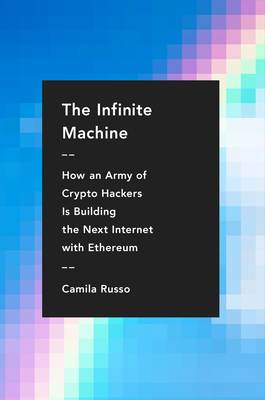
The Infinite Machine
How an Army of Crypto-hackers Is Building the Next Internet with Ethereum
کتاب های مرتبط
- اطلاعات
- نقد و بررسی
- دیدگاه کاربران
نقد و بررسی

May 1, 2020
A deep dive into efforts to build the next internet, one free of government interference and regulation. Russo, a leading cryptocurrency journalist, recounts the story of "an idealistic hero, his band of misfits, and the challenges they face to make their incredibly ambitious dream a reality." The hero is Russian Canadian programmer Vitalik Buterin, gifted in mathematics and committed to a certain kind of anarchy, with numerous like-minded allies scattered across the globe. Some, like Russo, are South American, convinced that the key to breaking government control is to develop a cryptocurrency even more thoroughly hidden away than Bitcoin. But that's only a start, a kind of proof of concept of a larger "world computer," the dream in question, called Ethereum. Cryptocurrency is just beginning--however, notes the author, it now outstrips many national economies in capital. By way of an analogy, explains one of the players in this book, "email was to the internet what Bitcoin, the cryptocurrency, was to blockchain technology," and Ethereum is bigger still, "bigger than any application built on top of it." Though, as Russo writes, it turns out that cryptocurrency is subject to the familiar boom and bust of the business cycle, there are still plenty of hackers working on it, even as government agencies such as the U.S. Securities and Exchange Commission seek to regulate it. The same is true of Ethereum, which seems more desirable than ever since "long-ago scrappy upstarts Facebook and Google had now become megacorporations serving as the main gateways to the internet." Russo's narrative, based on more than 100 interviews, is dense, detailed, and often overstuffed. It's also quite arcane, and it could use some of the patient explication that Michael Lewis and Katie Hafner, among other technology writers, bring to bear on their work. A slog, but it will interest small-L libertarian techies.
COPYRIGHT(2020) Kirkus Reviews, ALL RIGHTS RESERVED.

July 1, 2020
Journalist Russo makes her literary debut inspired by her fascination with Ethereum, a company whose cryptocurrency, ether, is the second-largest cryptocurrency after bitcoin. Formerly with Bloomberg, Russo has largely based her book on interviews she conducted with many people involved with Ethereum and cryptocurrency. She captures the idealism that motivates many of these people: a desire for a decentralized society possible now, they believe, via blockchain technology. Using blockchain, people will be able to interact with each other directly, without relying on intermediaries such as government, banks, and corporations. Ethereum wishes for individuals to have control over their money and their lives. The book narrates the efforts of Ethereum to build a world computer with an open-source protocol that will permit applications to be built by anyone who knows how, thus allowing people to avoid the large institutions that characterize modern society. The ether cryptocurrency allows people to use the portal. Russo is fairly (but not totally) successful in making the technology involved comprehensible to nontechnologists. VERDICT This will appeal to people fascinated with the possibilities of cryptocurrency, as well as those interested in the personalities involved and the business history of the concept.--Shmuel Ben-Gad, Gelman Lib., George Washington Univ., Washington, DC
Copyright 2020 Library Journal, LLC Used with permission.

























دیدگاه کاربران